2019 Jeep Compass Trailhawk India review, test drive
Diesel engine? Check. Automatic transmission? Check. Added off-road ability? Check. The Jeep Compass Trailhawk has the specs but what's it like?
Published on Jun 05, 2019 09:00:00 AM
55,071 Views
Follow us on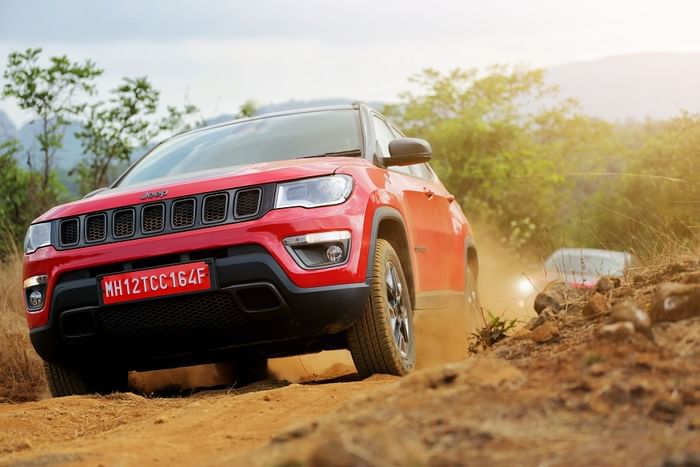

Hill descent control is standard.
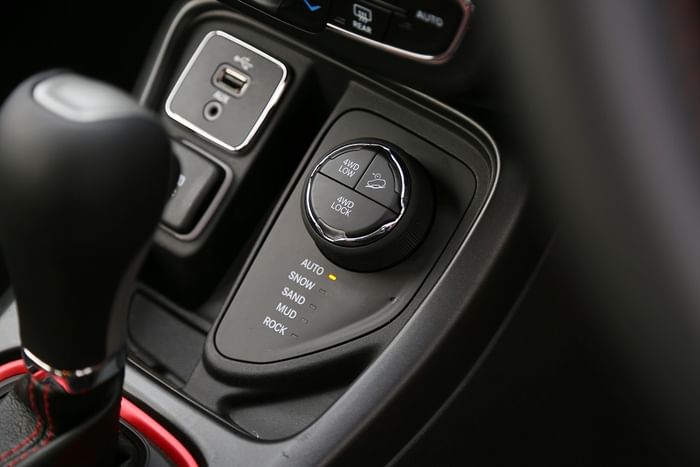
Rock mode exclusive to the Trailhawk.
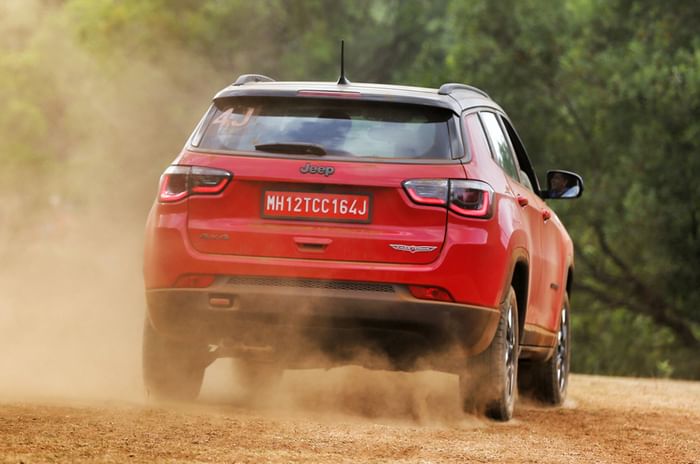
Subtle details distinguish the Trailhawk's look.
What is it?
In a nutshell, the Trailhawk is the most rugged version of the Jeep Compass you can buy. The ‘Trail Rated’ logos on the SUV are no less than badges of honour from Jeep affirming this version’s off-road ability. The Trailhawk sits higher off the ground, its 4x4 system benefits from the new 9-speed automatic transmission's short gearing and the off-road mode selector see the addition of a dedicated ‘Rock’ mode, all to keep you covered for any off-road eventuality. But that’s not all that makes the Trailhawk special. It’s also the first Compass in India to get a BS6 emission norms-compliant version of the 2.0-litre Multijet II diesel. This upgraded engine and automatic transmission will also be rolled out to everyday versions of the Compass in the months to come.
What’s it like on the outside?
From a distance, the Trailhawk can pass off as any other Jeep Compass. The basic look is the same and it’s only when you get closer that you see the Trailhawk-exclusive elements. There’s an additional 27mm of ground clearance (now up to 205mm) though it’s most noticeable at the wheel arches where there’s more of a gap between the body work and tyres. Talking tyres, the Falken All Terrain rubber is unique to the Trailhawk and comes wrapped around sleek dual-tone 17-inch wheels. See the black decal on the bonnet? It adds distinction to the Trailhawk’s look but is primarily there to cut glare – a huge help on inclines. What’s missing on the India-spec Trailhawk are the trademark red tow hooks up front. The reason? India’s latest pedestrian protection norms don’t allow for protrusions of any sort on the front end. The single tow hook at the rear, however, is rated to pull 1.5 times the vehicle’s gross weight.
Of the other things, the front and rear bumpers have been reshaped to allow for improved manoeuvrability. The Trailhawk’s approach, ramp breakover and departure angles read 26.5 degrees, 21.2 degrees and 31.6 degrees, respectively. Jeep has also repositioned the air intake to enhance water wading depth to 483mm, from the standard version’s 330mm. Also, hidden from view are the Compass Trailhawk’s skid plates that provide essential protection under the engine, floor and exhaust.
| Jeep Compass Price, Mileage, Specifications, Features and Variants | |
|---|---|
| Brand | Jeep |
| Model Name | Compass |
| Jeep Compass Price | ₹ 24.33 - 37.99 lakh |
| Jeep Compass Range/Mileage | Diesel : 15.3 - 17.3kpl |
| Jeep Compass Specifications | SUV | 5 doors | 5 seats View All Specs |
| Jeep Compass Features | LED headlight | 10-inch Touchscreen display | 6 airbags View All Features |
| Jeep Compass Variants | 2.0 Diesel Sport | 2.0 Diesel Longitude | 2.0 Diesel Longitude AT View All Variants |
What’s it like on the inside?
Again, there’s nothing new to report of about the Compass Trailhawk’s interior. The all-black cabin theme is really the biggest point of difference to the standard Compass. The darker hues (also seen on the Black Pack edition Compass) might make the interior seem less airy but will be less of a pain to clean up after an off-road session that involves some level of muddied boots and attire. Red double-stitching on the seats, steering and door pads, and red accents around the instrument cluster, gear lever and speakers add some colour to the Trailhawk’s cabin. Fit and finish are just as good as before, with generous use of soft materials upping the ambience. And just like the standard Compass, the Trailhawk is easy to get into and out of, comes with well-padded seats and offers reasonable space for four large adults.
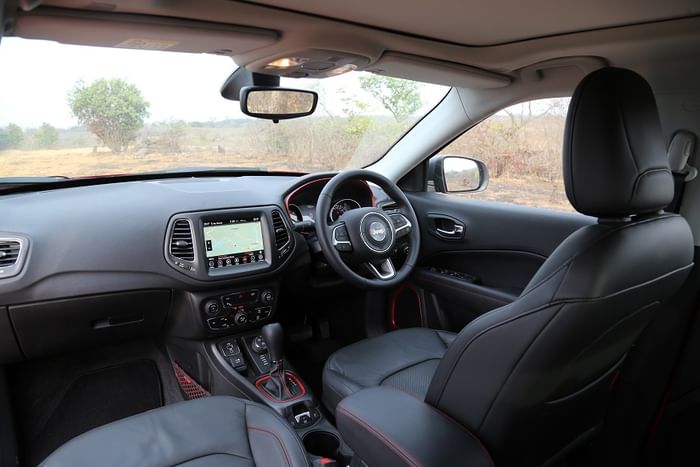
Interestingly, while the Trailhawk sits at the top of the Compass range, it isn’t the best-equipped version of the SUV on sale. It misses out on a powered driver’s seat as well as auto headlights and wipers, features that are part of the package on the Compass Limited Plus. The latter’s massive panoramic sunroof is also a Rs 70,000 option on the Trailhawk. The Trailhawk does come with standard-fit bi-xenon headlights, keyless go, cruise control and an 8.4-inch touchscreen infotainment system with onboard navigation, Android Auto and Apple CarPlay. A 7.0-inch multi-information display and engine start/stop are unique to the Trailhawk while side and curtain airbags, ESC, traction control, hill-start assist, hill descent control and an electronic parking brake make up the SUV’s safety suite.
What’s it like to drive?
We’ll get to what the Jeep Compass Trailhawk is like off-road in a bit. For now, let’s talk of what it’s like in mundane, everyday driving conditions. The news is good. Jeep engineers have used the emissions upgrade as an opportunity to also fine-tune other aspects of the powertrain and the very first point of note is how much quieter the engine is. The harsh clatter at idle has been muffled, the whistle from the turbo is gone and there’s less boom in the mid-range too. The characteristic Multijet drone is still present but, in general, you hear much less from the engine bay.
Also different is how the engine delivers its power. The BS6 version of the engine makes the same 173hp at 3,750rpm and 350Nm of torque at 1,750-2,500rpm but the power comes in in a milder and more linear manner. Low-speed drivability has improved, and the engine stays likeable higher up the rev band too, but what’s missing is the older BS4-spec engine’s rush of power at 2,000rpm. Jeep has also recalibrated throttle responses to quicken low-speed responses and you can feel the difference in city driving.
Undoubtedly, what makes the biggest difference to the driving experience is the 9-speed automatic transmission. Constant on-off throttle inputs can result in some shift shock but on the whole the torque converter gearbox is smooth and shuffles through the gears with ease. The gearbox is tuned to shift up early and, in turn, helps refinement by keeping engine revs under 2,000rpm for the most part. A steady cruise on the highway in ninth gear has the engine spinning at a relaxed 1,500rpm. Convenient as the 9-speed unit is, it isn’t the quickest on the draw, in either auto or manual modes. There’s no Sport mode to speed things up and manual shifts commanded by the gear lever (there are no paddleshifters) aren’t particularly snappy either. In our acceleration runs, we managed a 0-100kph time of 12.5sec, which is down on the Hyundai Tucson AWD’s 10.05sec time.
If not for outright performance, you’ll like the Trailhawk for its ride quality. The standard Compass’ suspension was already an excellent starting point and the Trailhawk’s reworked setup (to compensate for more weight and higher ride height) takes things up a notch. Gentler rebound has addressed much of the standard Compass’ low-speed firmness and even at higher speeds the Trailhawk feels better damped; body movements are really well contained. The Trailhawk is also nice to steer, though the tyres squeal in protest even in medium corners. Push hard into a turn and the Trailhawk will venture into understeer.
Then again, the Trailhawk isn’t as much about high-speed dynamics as it is about low-speed off-road ability. And this is an area that the Trailhawk absolutely nails. Jeep’s chosen trail for the media drive was fairly serious off-road fare, with rutted tracks, steep ascents and descents, a mild water crossing and rocky paths making up the course. To the Trailhawk’s credit, the course didn’t feel as threatening as it looked. While the Compass’ relatively small size, fair articulation and impressive approach and departure angles were a boon in the wild, we were also deeply impressed by how far the Selec-Terrain system’s Auto mode could take us. On the real tricky stuff though, 4-Low was summoned. With 4-Low engaged, the Compass Trailhawk seemed unstoppable and even chugged up, down and around a rock-laden incline with surprising ease. Sorry for the cliché but the 20:1 crawl ratio really does give the Trailhawk the abilities of a mountain goat.

Should I buy one?
If you are big into off-roading and find the existing selection of ladder frame SUVs too unwieldy (and/or expensive), the Jeep Compass Trailhawk is tailor-made for you. It lives up to its billing as a go-anywhere SUV, and how. It’s a hardcore Jeep through and through and one you’d confidently take to explore the expanse of our country in.
But for all its attitude and ability, the Trailhawk’s main selling point is likely to be its gearbox, at least till such time Jeep rolls out the automatic transmission on the regular Compass. Judged as an automatic SUV, then, the Trailhawk scores well adding in convenience to an already well-liked package. The improvements to refinement and ride comfort only make the deal sweeter still.
The Jeep Compass Trailhawk has been priced at Rs 26.8 lakh (ex-showroom, Delhi). While the Compass Trailhawk is pricey for an SUV of its size, the fact is that few models can match the its breadth of abilities. If you want an SUV that does it all, this is it.
Photography: Gaurav Thombre
Tech Specs 
Copyright (c) Autocar India. All rights reserved.

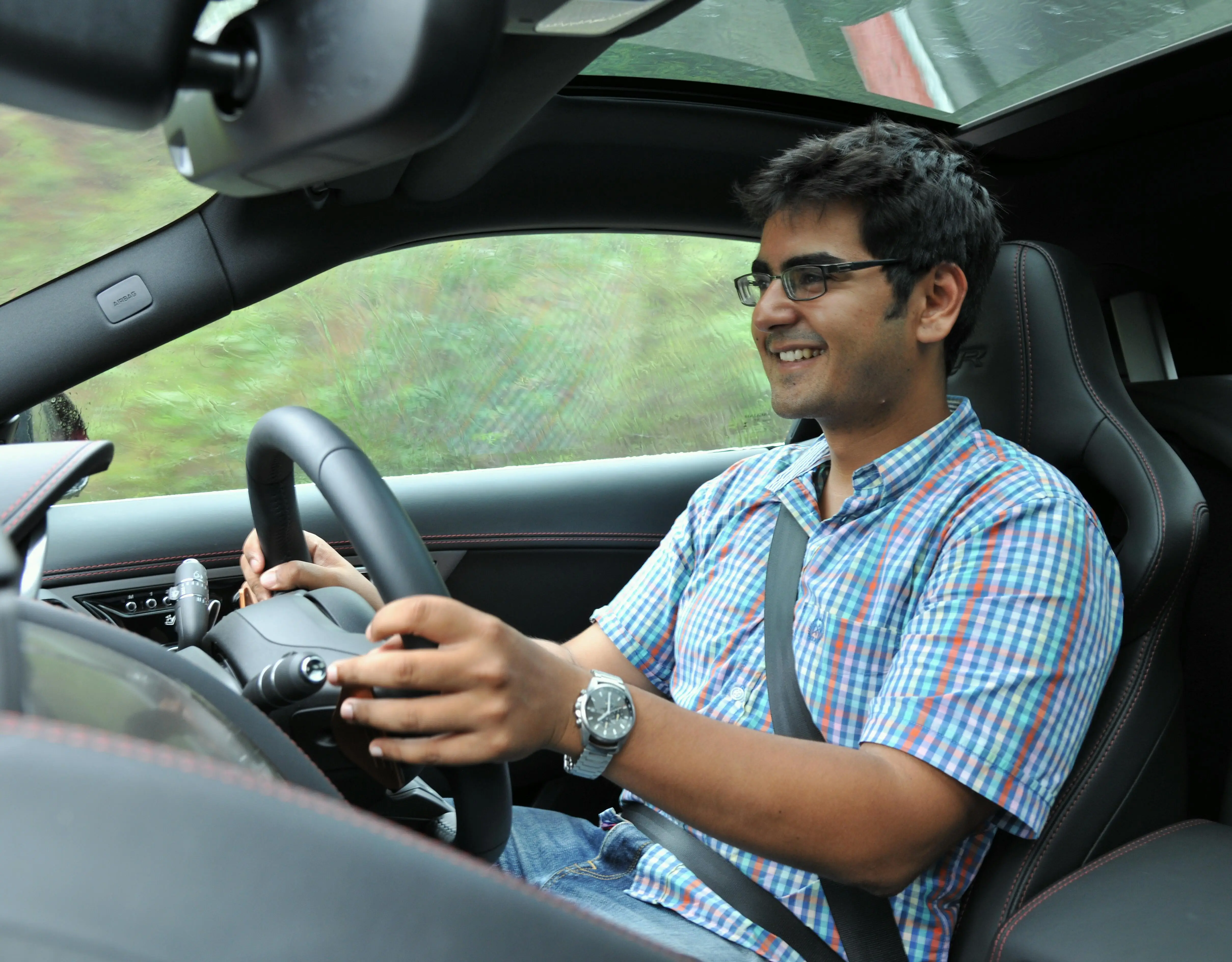
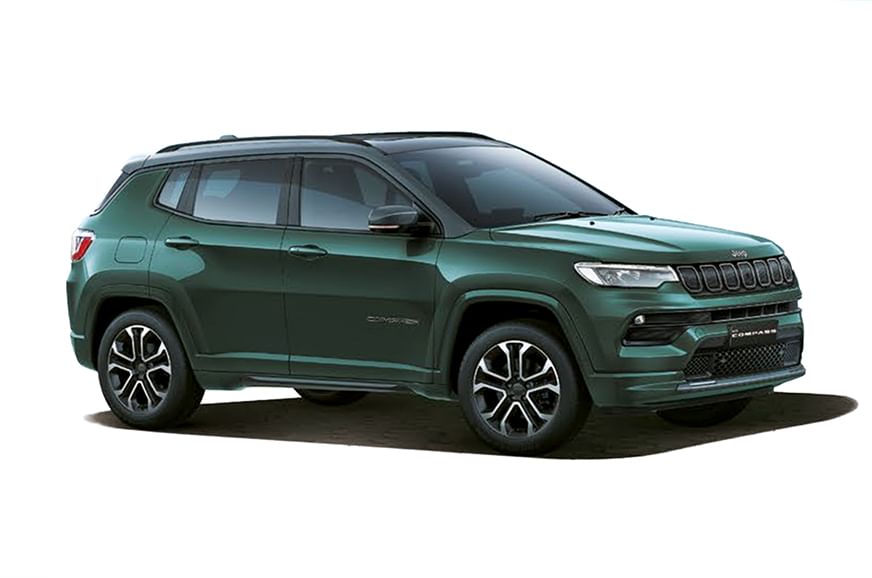




 Engine
Engine Transmission
Transmission Body
Body Suspension
Suspension Steering
Steering Brakes
Brakes Dimensions
Dimensions
Comments
Member Login
Personal Details
No comments yet. Be the first to comment.